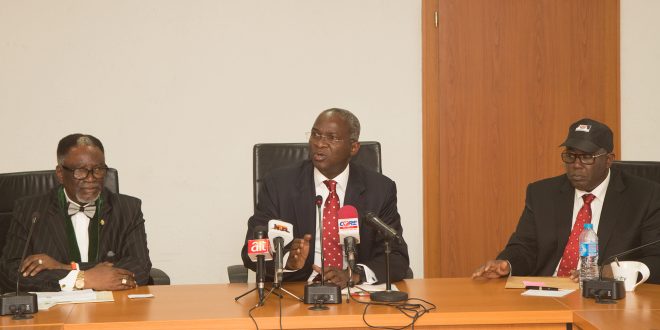- Says more attention should be paid to the process leading to emergence of leadership of local governments
- Calls for a change of the revenue allocation formula to provide for more resources to local governments
- “The battle to overcome poverty, disease, illiteracy, infant and maternal mortality and many indices of our underdevelopment will be fought, won and lost at the Local Government level”, he says
Minister of Power, Works and Housing, Mr. Babatunde Fashola SAN, has advocated the reform of the local government administration in the country saying the present situation did not reflect the onerous Constitutional responsibilities and mandate on that level of government.
Fashola, who delivered a keynote speech at the Nigerian Institute of International Affairs (NIIA), Victoria Island, Lagos, venue of the public presentation of two books, “Modern Administrative Law and Practice in Nigeria” and “Local Government Law Cases and Materials” by a legal scholar, Professor Oyelowo Oyewo, said such reform had become expedient in view of the fact that their responsibilities represent the difference between underdevelopment and development as well as the difference between poverty and prosperity.
Listing such responsibilities as Health Services, Primary Education, Public Conveniences, Sewage and Refuse Disposal, Registration of all births, deaths and marriages, Fashola, who noted that these responsibilities border on the right to life, pointed out that the battle to overcome poverty, disease, illiteracy, infant and maternal mortality and many indices of underdevelopment would be fought, won and lost at the Local Government level.
The Minister said in view of this constitutional mandate, there should be a change in the nation’s revenue allocation formula to provide more resources to the local governments while care and attention should be paid to the leadership recruitment process that leads to the emergence of chairmen and officials of local governments.
Arguing in support of more revenue allocation to local governments, Fashola cited the fact that out of about 200,000kilometres of the nation’s road network , the Federal Government owns 16 per cent and the state governments 18 per cent while the local governments own 66 per cent adding that there are also more primary schools and primary health care facilities and more personnel at the local government level.
Describing these facts as “glaring examples of the largely unintended mandate that local governments have”, the Minister declared, “We must be more attentive to the leadership recruitment process leading to the emergence of Local Government chairmen and other officials serving at this level; we must reform it in the way that it attracts our best eleven not our reserve eleven; as a people, we must ourselves pay more attention to this government and vote at the elections”.
On the right to life as the constitutional mandate of local governments, Fashola explained that such responsibilities as health services, primary education, public conveniences, sewage and refuse disposal all border on the right to life expressing regrets, however, that although it is guaranteed under the constitution, right to life is not yet fully or effectually enjoyed in the country.
“A lot of access is either unavailable or denied at the closest health facility to the people, which is the primary health care service. Unfortunately, we lose babies and mothers at birth at a rate that makes nonsense of the right to life”, the Minister said adding that ante-natal care, regular deliveries by trained birth attendants, immunization against polio, cholera, measles and malaria treatment, among others, were things that should be dealt with at the local government level.
Calling for more primary healthcare facilities at the local government levels, he, however, regretted that a combination of lack of resources and personnel had contrived to deprive them of their ability to deliver adding that this has led to “migration to secondary hospitals for things as basic as immunization, ante-natal care and malaria treatment” with doctors burdened with attending to as many as 70 patients a day.
Fashola, who noted that a patient should ideally not go to a secondary hospital without a referral form from the primary one, recalled his tenure as Governor of Lagos State when, according to him, “We decided to take over one primary facility from each Local Government and deliver a 24-hour service in each one”, adding that the services were expanded to include screening for AIDS, Tuberculosis and certain levels of cancer.
“We expanded the services to include screening for AIDS, Tuberculosis and certain levels of cancer and delivered these services in Alimosho, Lagos Island, Oregun and Epe to mention a few. We had also started installing solar power to guarantee 24-hour service in places like Epe, and I hope that these will continue in order to ensure the right to life”, he said.
On right to employment as part of local government mandate, the Minister said the right derived from the fact that only those who have skills could get jobs pointing out that foundational education, the ability to read and write and to overcome illiteracy was most impactful at the primary level.
He further argued in favour of sanitation and proper sewage and refuse disposal and management describing it as a major contributory factor to the victory of wellness over illness. He declared, “Our victory over the scourge of refuse management helped to consign the previous reputation as one of the dirtiest cities in the world to one of order and cleanliness”.
“Even when we survive childbirth, illness is an ever present threat to the right to life. Good health is, therefore, a function of who wins the battle between illness and wellness”, he said adding that the incidents of diseases like Lassa Fever in some states bore testimony to the work that could and remained to be done at the local government level with regards to sanitation.
Fashola again recalled his tenure as Governor of Lagos State when his administration partnered with local governments by supplementing the cost of refuse management which Local Governments alone could not foot, with their huge teachers and health worker’s bills.
He declared, “This is why incidents of polio infections were not occurring in Lagos, this is why we could respond to Ebola because hand washing was already being taught in all our schools before Ebola came”.
On the responsibility of local governments over births, deaths and marriages, Fashola stressed the importance of accurate data pointing out that “without records of the number of arrivals (births); departures (deaths) and potential arrivals (marriages)”, there could be no way of projecting the number of classrooms, hospital beds, water supply, power supply or even refuse collection, management and food supply needed in any locality, city or even country at any particular period in time.
The Minister argued that the importance of local governments was most manifest in the fact that the constitution also places the responsibility for ‘Establishment and Maintenance of Cemeteries, Burial grounds on that level of government adding, “Yes, it is called local, but it is the Governor of our entire life’s journey; our arrival at health centres, our education at primary and vocational centres, and our unquestionable departure at cemeteries and burial grounds”.
On political and fiscal autonomy, Fashola, who affirmed that the constitution guarantees political autonomy to the local government, however, added, “It is yet another matter, if the holder of that office lacks the understanding of the nature of his constitutional authority and fails to seek legal redress for any infraction of the authority by anybody”.
“To the extent that state governors are also prescribed to be elected by the constitution and they have always sought redress in the courts to address or redress infractions of their constitutional space or rights, local governments should do same”, he said adding that the constitution also recognized that State Houses of Assembly could legislate certain matters to regulate the operations of Local Governments in order to improve and harmonize service delivery.
On Fiscal Autonomy, Fashola, who made reference to Section 162 (6)(7)(8) of the constitution which provides for state and Local Government joint account, declared, “Ordinarily, this should not be a source of problem, except that there have been yet unsubstantiated allegations of state governments seizing funds belonging to local governments.
“I say yet unsubstantiated because if true, they are constitutional violations that should be redressed in court, just as the seizure of local government funds by the Federal Government was rightly condemned by the Supreme Court. This therefore goes to the question of leadership at the Local Government, and the kind of legal advice they seek and get”, he said.
Expressing gratitude to the organizers of the event for the honour of delivering the keynote speech, Fashola particularly thanked Professor Oyelowo Oyewo, whom he described as, not only a teacher of Repute but also a scholar of many hues, and the University of Lagos for their support for the Lagos State Government during his tenure of service.
 Hottestgistnaija.com
Hottestgistnaija.com





